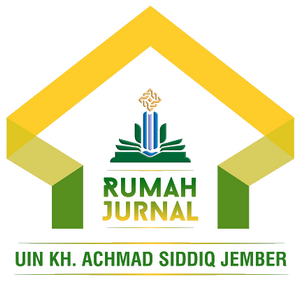The Scientific Sanad Tradition of Islamic Boarding Schools as a Basis for Strengthening Moderate Religion in the Post-Truth Era
DOI:
https://doi.org/10.35719/ijibs.v2i1.29This article discusses the impact of new media on the dissemination of religious ideology, particularly in Indonesia, where the process of spreading Islam has traditionally been carried out through face-to-face meetings between students and teachers. With the rise of the internet, however, the transfer of religious knowledge has shifted to digital spaces such as websites, social media, and other online platforms. This has led to a proliferation of religious content and a blurring of the religious expert authorities, some of which may hold extremist and intolerant views. The objective of the study is to examine the major role of the pesantren educational tradition as the basis for strengthening religious moderation in the post-truth era. In the post-truth era, there are shifting models of Islamic da’wah which was originally at the practical level to the media level, as well as the rise of neko77 phenomenon where the objective facts do not influence public opinion. The researcher used a qualitative approach to identify the role and implications of the sanad tradition on the high index of potential for radicalism by internet users. Qualitative work steps such as observation, documentation, and literature study techniques were used by the author in this research. The researchers identified that Islamic boarding schools in their history are closely related to the scientific sanad tradition which can be a counter to extremist religious content in social media. The scientific sanad tradition in Islamic boarding schools has argumentatively not easily believed in religious doctrines without going through direct contact with spiritual teachers. The principle of continuous scientific sanad tradition between teachers and students, as well as direct scientific transformation, is important amid the acceptance of religious narratives circulating on social media regardless of their source and legitimacy.
References
Admin. “Ini Hasil Penelitian BNPT Terkait Radikalisme.” Nusantaratimur.com, 2020. https://www.nusantaratimur.com/2020/12/ini-hasil-penelitian-bnpt-terkait.html%0Afiles/795/ini-hasil-penelitian-bnpt-terkait.html.
Asosiasi Penyelenggara Internet Indonesia (APJII). “Profil Internet Indonesia 2022.” APJII, 2022. https://apjii.or.id/gudang-data/hasil-survei.
Badan Pengembangan dan Pembinaan Bahasa. KBBI. Jakarta, 2016. https://doi.org/10.22146/jps.v3i1.23524.
Bruinessen, Martin van. “Traditionalist and Islamist Pesantrens in Contemporary Indonesia.” The Madrasa in Asia, no. May 2024 (2019): 217–46. https://doi.org/10.1515/9789048501380-010.
Dhofier, Zamakhsyari. Tradisi Pesantren : Studi Pandangan Hidup Kyai Dan Visinya Mengenai Masa Depan Indonesia. LP3ES, 2015.
Ilmiah, Rikhlatul, Taha Romadhan Zaghloul, and Depict Pristine. “Moderate Islamic Boarding School Education.” Ijibs 1, no. 1 (January 3, 2023): 33–42. https://doi.org/10.35719/ijibs.v1i1.19.
Jati, Wasisto Raharjo. “Cyberspace, Internet, Dan Ruang Publik Baru: Aktivisme Online Politik Kelas Menengah Indonesia.” Jurnal Pemikiran Sosiologi 3, no. 1 (January 25, 2016): 25. https://doi.org/10.22146/jps.v3i1.23524.
Mujibbudin, Muhammad, and Muhammad Fakhru Riza. “Kontestasi Ideologi Web Keislaman Populer Di Indonesia: Antara Moderatisme, Salafisme, Dan Islamisme.” Penelitian Kompetitif SBKU Badan Litbang dan Diklat Kementerian Agama RI, 2020. https://simlitbangdiklat.kemenag.go.id/simlitbang/id/penelitian/detail/zAWQR_aAbx_sfAFA_lAPOW.
Mujibuddin SM, M. “Kontruksi Media Dalam Gerakan Islam Populis 212.” Jurnal Sosiologi Agama 12, no. 2 (December 22, 2018): 261. https://doi.org/10.14421/jsa.2018.122-05.
Muliana, Siti. “Grounding Wasathiyah Islam on The Internet Da’wah Islam Wasathiyah In Mainstream Website Of Moderate Islam Indonesia.” Jurnal Studi Sosial Keagamaan Syekh Nurjati 2, no. 1 (May 31, 2022): 49–67. https://doi.org/10.24235/sejati.v2i1.13.
Renaningtyas, Peni Catur, Siti Rosilawati Ramlan, and Djunaidi Ghony. “Learning the Values of Multicultural Islamic Education as an Effort to Solve Santri Delinquency.” IJIBS 1, no. 1 (January 2, 2023): 23–32. https://doi.org/10.35719/ijibs.v1i1.18.
Sa’diyah, Miftahus, and Maslathif Dwi Purnomo. “Grounding Aswaja: Efforts to Stem the Movement of Religious Radicalism in Nurul Islam Jember Boarding School.” Ijibs 1, no. 1 (January 2, 2023): 1–8. https://doi.org/10.35719/ijibs.v1i1.1.
Sakhok, Jazilus. Pesantren Sebagai Subkultur Pengemban Islam Moderat. Majalah Suara Pandanaran. Vol. 2. Yogyakarta: Majalah Suara Pandanaran, 2007.
Sugiyono. Metode Penelitian Kuantitatif, Kualitatif Dan R &Metode Penelitian Kuantitatif, Kualitatif Dan R & D.Bandung:Alfabeta. Bandung:Alfabeta. Bandung: Alfabetta, 2016.
Sunyoto, Agus. Atlas Wali Songo: Buku Pertama Yang Mengungkap Wali Songo Sebagai Fakta Sejarah. Kerjasama Pustaka IIMaN, Trans Pustaka, dan LTN PBNU, 2012.
Qur’an.com. “Surat Al-Baqarah 143-144,” 2023. https://quran.com/al-baqarah/143-144.
Tahaj, Reza Al, and Jerry M. Logahan. “Counter Radicalization Analysis in Efforts to Prevent the Spread of Radical Ideology in Indonesia.” Journal of Strategic and Global Studies 2, no. 1 (January 30, 2019). https://doi.org/10.7454/jsgs.v2i1.1016.
Tamam, B. Pesantren, Nalar Dan Tradisi: Geliat Santri Menghadapi ISIS, Terorisme, Dan Transnasionalisme Islam. Pustaka Pelajar. Pesantren, Nalar Dan Tradisi: Geliat Santri Menghadapi ISIS, Terorisme, Dan Transnasionalisme Islam. Pustaka Pelajar, 2015.
Thompson, Robin. “Radicalization and the Use of Social Media.” Journal of Strategic Security 4, no. 4 (2011): 167–90. https://doi.org/10.5038/1944-0472.4.4.8.
Ulya, Ulya. “Post-Truth, Hoax, Dan Religiusitas Di Media Sosial.” Fikrah 6, no. 2 (December 27, 2018): 283. https://doi.org/10.21043/fikrah.v6i2.4070.
Wasathiyyah Wawasan Islam tentang Moderasi Beragama. Shihab, Quraisy. Tangerang: Lentera Hati, 2019.
Widyaningsih, R, and Kuntarto. “Local Wisdom Approach to Develop Counter- Radicalization Strategy.” IOP Conference Series: Earth and Environmental Science 255 (May 10, 2019): 012049. https://doi.org/10.1088/1755-1315/255/1/012049.
Woodward, Mark, Inayah Rohmaniyah, Ali Amin, and Diana Coleman. “Muslim Education, Celebrating Islam and Having Fun As Counter- Radicalization Strategies in Indonesia.” Perspective on Terrorism 4, no. 4 (2010): 28–50.
Downloads
Published
Issue
Section
License
Copyright (c) 2024 Siti Muliana, Mad Yahya, Taaibah Ngaunillah Rohmatun

This work is licensed under a Creative Commons Attribution-NonCommercial 4.0 International License.
License
1. Author’s Warranties
The author warrants that the article is original, written by stated author/s, has not been published before, contains no unlawful statements, does not infringe the rights of others, is subject to copyright that is vested exclusively in the author and free of any third party rights, and that any necessary written permissions to quote from other sources have been obtained by the author(s).
2. Miscellaneous
IJIBS will publish the article (or have it published) in the journal if its editorial process is successfully completed and IJIBS or its sublicensee has become obligated to publish it. IJIBS may conform the article to a style of punctuation, spelling, capitalization, and usage that it deems appropriate.

















 IJIBS licensed under Creative Commons Attribution-NonCommercial 4.0 International License.
IJIBS licensed under Creative Commons Attribution-NonCommercial 4.0 International License.